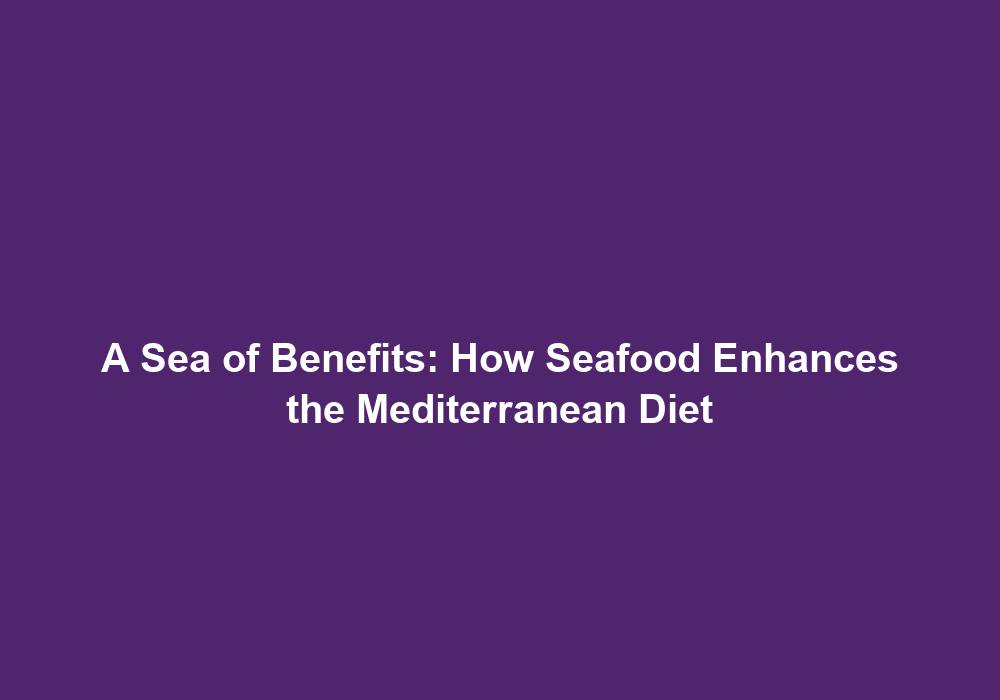A Sea of Benefits: How Seafood Enhances the Mediterranean Diet
The Mediterranean diet has gained significant attention in recent years due to its numerous health benefits. Central to this diet is the consumption of seafood, which plays a vital role in enhancing its overall nutrition and promoting a healthy lifestyle. In this article, we will explore the sea of benefits that seafood brings to the Mediterranean diet.
Why Seafood is Essential in the Mediterranean Diet
Seafood is an essential component of the Mediterranean diet due to its rich nutritional profile and numerous health benefits. Let’s delve deeper into why seafood is a must-have for anyone following this diet:
-
Rich in Omega-3 Fatty Acids: Seafood, especially fatty fish like salmon, tuna, and sardines, is an excellent source of omega-3 fatty acids. These essential fats are known to support heart health, lower blood pressure, and reduce the risk of chronic diseases such as cardiovascular disorders. Omega-3 fatty acids help improve heart function, reduce inflammation, and promote overall cardiovascular well-being.
-
Protein Powerhouse: Seafood is a high-quality source of lean protein. Incorporating seafood into the Mediterranean diet ensures an adequate intake of essential amino acids necessary for muscle repair, growth, and overall body functioning. Protein is essential for building and repairing tissues, supporting a healthy immune system, and regulating various biochemical processes in the body.
-
Abundant in Essential Nutrients: Seafood is packed with essential nutrients like vitamins D, E, and B12, as well as minerals like iodine, selenium, and zinc. These nutrients play a crucial role in various bodily functions, including bone health, immune system support, and cognitive function. Vitamin D is essential for calcium absorption and bone health, while vitamin E acts as a powerful antioxidant that protects cells from damage. Vitamin B12 is necessary for the production of red blood cells and the maintenance of a healthy nervous system.
The Benefits of Seafood in the Mediterranean Diet
1. Promotes Heart Health
Seafood’s high omega-3 fatty acid content makes it a heart-healthy addition to the Mediterranean diet. These healthy fats help reduce inflammation, lower bad cholesterol levels, and decrease the risk of blood clots. Consuming seafood regularly can contribute to a healthy cardiovascular system and reduce the incidence of heart diseases. Omega-3 fatty acids also help maintain proper heart rhythm and reduce the risk of abnormal heartbeats.
2. Supports Brain Function
Omega-3 fatty acids found in seafood are vital for brain health and development. Research suggests that regular consumption of seafood may help improve memory, enhance cognitive function, and prevent age-related cognitive decline. DHA, one of the omega-3 fatty acids present in seafood, is a major structural component of the brain and plays a crucial role in brain development and function. Including fish in the Mediterranean diet may contribute to better brain health and overall mental well-being.
3. Reduces Inflammation
Chronic inflammation is associated with various diseases, including heart disease, diabetes, and certain types of cancer. Seafood’s anti-inflammatory properties can help combat inflammation in the body, thanks to its omega-3 fatty acids and other bioactive compounds. Omega-3 fatty acids inhibit the production of inflammatory substances in the body, reducing the risk of chronic diseases. By reducing inflammation, seafood consumption can contribute to a lower risk of chronic diseases.
4. Aids in Weight Management
The Mediterranean diet, combined with seafood, is known for its weight management benefits. Seafood is generally low in calories and saturated fats, making it a healthy protein source for those seeking to lose weight or maintain a healthy weight. The high protein content of seafood also promotes satiety, helping individuals feel fuller for longer periods and reducing the likelihood of overeating. Additionally, the omega-3 fatty acids in seafood help regulate appetite and metabolism, making it a valuable addition to a weight management plan.
5. Supports Eye Health
Certain types of seafood, such as salmon and tuna, are rich in omega-3 fatty acids and antioxidants like vitamin E and zinc. These nutrients are beneficial for maintaining optimal eye health, reducing the risk of age-related macular degeneration (AMD), and promoting good vision. Omega-3 fatty acids help protect the eyes from oxidative damage and inflammation, while vitamin E and zinc play crucial roles in maintaining the health of ocular tissues. Including seafood in the Mediterranean diet can contribute to maintaining healthy eyesight throughout life.
6. Enhances Skin Health
Seafood’s omega-3 fatty acids and antioxidants can benefit skin health by reducing inflammation, protecting against sun damage, and promoting collagen synthesis. Regular seafood consumption may aid in maintaining youthful and glowing skin, while also alleviating skin conditions such as eczema and psoriasis. Omega-3 fatty acids help maintain the skin’s natural barrier function, improve hydration, and reduce the risk of skin disorders. Antioxidants like vitamin E protect the skin from free radical damage caused by sun exposure and environmental factors.
Tips for Incorporating Seafood into the Mediterranean Diet
To fully enjoy the benefits of seafood in the Mediterranean diet, here are some tips to help you incorporate it into your meals:
- Aim for at least two servings of seafood per week, including fatty fish like salmon, mackerel, or trout. These fish are particularly rich in omega-3 fatty acids.
- Try grilled or baked seafood recipes using Mediterranean herbs and spices such as olive oil, garlic, lemon, and oregano. These ingredients add flavor and enhance the nutritional value of your dishes.
- Explore a variety of seafood options, including shellfish like shrimp, crab, and mussels, to diversify your nutrient intake. Each type of seafood offers unique health benefits and flavors.
- Incorporate seafood into salads, pasta dishes, or as a topping for whole-grain pizzas to add flavor and nutritional value. Get creative with your recipes to make seafood a delicious part of your Mediterranean diet.
- Consider sustainable seafood options and purchase from reputable sources to support both your health and the environment. Look for eco-certifications and labels that ensure responsible fishing practices.
- If you have dietary restrictions or allergies, consult with a healthcare professional or registered dietitian to find suitable seafood alternatives. They can help you identify seafood options that align with your dietary needs and preferences.
In conclusion, seafood provides a sea of benefits when incorporated into the Mediterranean diet. Its rich nutritional profile, including omega-3 fatty acids, protein, essential vitamins, and minerals, supports heart health, brain function, weight management, and overall well-being. By embracing seafood as a central component of the Mediterranean diet, individuals can enjoy a delicious and nutritious way of eating that promotes a healthy lifestyle for years to come.







